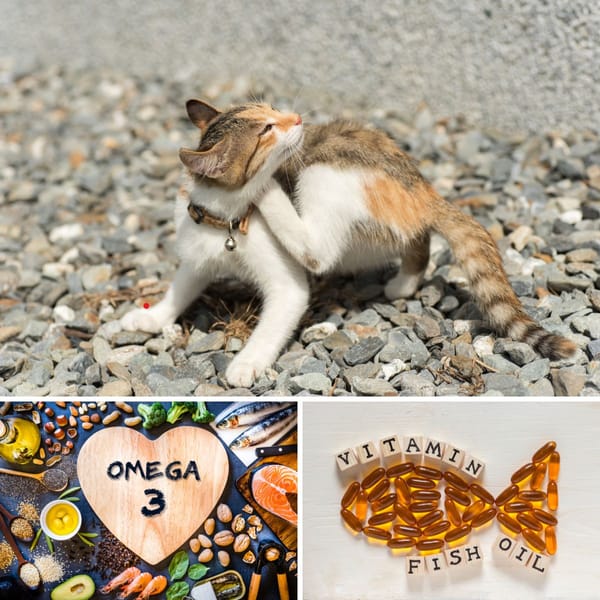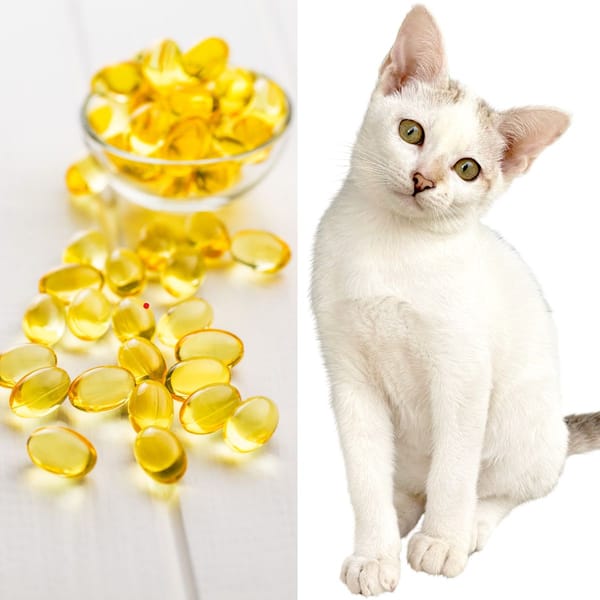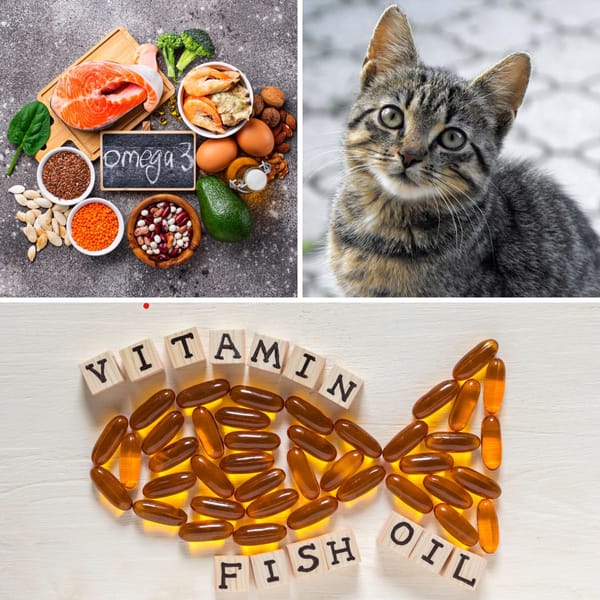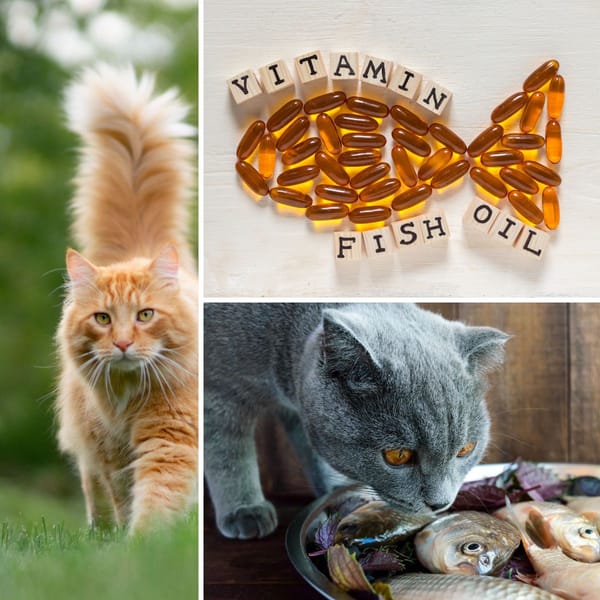Key Takeaways:
- Omega-3 fatty acids can be beneficial for cats with kidney disease by reducing inflammation and preserving kidney function.
- The appropriate dosage of omega-3 for cats with kidney disease should be determined by a veterinarian based on the cat's weight and stage of renal disease.
- Incorporating omega-3 into a cat's diet requires careful consideration of the source and balance with other nutrients to avoid potential health risks.
Chronic kidney disease (CKD) is a prevalent issue among the feline population, particularly in senior cats. As pet owners, understanding how to manage this condition is crucial for maintaining the quality of life of our furry companions. One aspect of dietary management that has gained attention is the role of omega-3 fatty acids in supporting renal health. This article delves into the intricacies of how much omega-3 is appropriate for cats with kidney disease and the potential benefits it may offer.
Understanding Chronic Kidney Disease in Cats
Chronic kidney disease is a progressive condition characterized by a gradual loss of kidney function over time. In cats, CKD can lead to a buildup of waste products in the blood, resulting in clinical signs such as increased thirst and urination, weight loss, and decreased appetite. Veterinary internal medicine has made strides in managing CKD, with dietary supplementation playing a pivotal role.
The Science Behind Omega-3 Fatty Acids
Omega-3 fatty acids, particularly eicosapentaenoic acid (EPA) and docosahexaenoic acid (DHA), are polyunsaturated fatty acids known for their anti-inflammatory effects. These essential fatty acids are not synthesized by the body and must be obtained through diet. They are integral to cell membranes and play a role in altering immune function, decreasing platelet aggregation, and providing anti-inflammatory benefits.
Omega-3 and Feline Renal Health
Research in veterinary medicine has suggested that omega-3 fatty acids can have a protective effect on the kidneys. In cats with chronic kidney disease, omega-3s may help reduce inflammation and slow the progression of renal failure. This is particularly important as CKD cannot be reversed, and management focuses on slowing disease progression and alleviating clinical signs.
Determining the Right Omega-3 Dosage
When it comes to how much omega-3 for cats with kidney disease, there is no one-size-fits-all answer. The dosage depends on factors such as the cat's weight, the stage of renal disease, and the specific balance of EPA and DHA. Veterinary therapeutic diets often include omega-3 fatty acids, but additional supplementation may be recommended by a veterinarian.
Sources of Omega-3 for Cats
Fish oils are a common source of omega-3 fatty acids for cats. Fish oil supplements specifically designed for companion animals can provide a controlled dose of EPA and DHA. It's essential to choose high-quality supplements to avoid contaminants like heavy metals. Flaxseed oil is another source, but it primarily provides alpha-linolenic acid (ALA), which cats convert to EPA and DHA less efficiently.
Exploring the Benefits of Omega-3 for Cats with Early Renal Insufficiency
Omega-3 fatty acids are not just a buzzword for human health; they're a critical component in managing early renal insufficiency in cats. When our feline friends begin to show signs of kidney stress, it's essential to look at how much omega-3 for cats with kidney disease can make a difference. These fatty acids are known for their anti-inflammatory effects, which can help protect the kidneys from further damage. By incorporating omega-3 into your cat's diet early on, you may help slow the progression of kidney disease and improve their overall quality of life.
In the early stages of renal insufficiency, ensuring adequate intake of omega-3 can support kidney function and potentially delay the onset of chronic renal insufficiency. It's not just about adding any supplement to your cat's diet; it's about finding the right balance that aligns with the National Research Council's recommendations for adult cats. Fatty acid supplements, when used correctly, can complement a therapeutic diet designed to manage kidney issues, offering a holistic approach to your cat's health.
Omega-3 Dosage Specifics for Kidney Health in Cats
When considering how much omega-3 for cats with kidney disease is appropriate, it's essential to strike a balance. Omega-3 fatty acids can have beneficial effects on kidney function by reducing inflammation and potentially slowing the progression of induced renal insufficiency. However, the exact dosage can vary based on factors like the cat's weight and the severity of the disease. Most vets recommend a tailored approach, as too much can lead to unwanted side effects such as blood clots or metabolic acidosis.
For healthy cats or those with early-stage kidney disease, integrating omega-3 into the cat's diet in a controlled manner is crucial. The anti-inflammatory effects of omega-3 can support renal health, but the dosage should be carefully monitored. In general, liquid forms of omega-3 supplements can be easier to dose and mix into wet food, ensuring that most cats receive the right amount without overdoing it. Always consult with a veterinarian, as they might refer to resources like "Vet Clin North Am Small Anim Pract" for the latest dosage guidelines.
The Impact of Omega-3 Dosage Based on Cat's Weight
When considering how much omega-3 for cats with kidney disease is appropriate, it's essential to factor in the cat's weight. Just like in humans, the dosage of supplements for cats should be proportional to their body weight to ensure efficacy and safety. A lightweight, nimble Siamese will require a different dosage compared to a hefty Maine Coon. It's not just about the amount, but also about the concentration of omega-3 fatty acids in the supplement. Vets often recommend starting with a lower dose and adjusting as needed, monitoring the cat's response to find the optimal balance.
Cats fed omega-3 in the right proportions can experience significant health benefits. The anti-inflammatory effects of omega-3 fatty acids can help reduce the stress on the kidneys, potentially slowing the progression of kidney disease. It's crucial to get the dosage right, though, as too much can lead to unwanted side effects, while too little may not provide the desired benefits. Always consult with a veterinarian to determine the correct dosage based on your cat's specific weight and health condition.
Omega-3 Fatty Acids: A Deep Dive into Anti-Inflammatory Effects
Omega-3 fatty acids are not just another supplement to toss into your cat's diet; they're a powerhouse of anti-inflammatory effects. When your furry friend is dealing with kidney disease, inflammation is a sneaky culprit that can exacerbate their condition. Omega-3s step in like tiny superheroes, potentially reducing inflammation and giving your cat's kidneys a fighting chance. It's like equipping your cat with a shield, guarding against further damage and promoting a more comfortable state of health.
But how does this work, you ask? Well, omega-3 fatty acids help to inhibit the production of substances that contribute to inflammation, such as eicosanoids and cytokines. This action can be particularly beneficial for cats with kidney disease, as it may help to slow the progression of renal damage. By incorporating omega-3s into your cat's diet, you're not just feeding them; you're actively participating in their health management.
Omega-3 Fatty Acids and Hydration in Feline Kidney Care
When considering how much omega-3 for cats with kidney disease, it's crucial to also focus on hydration. Cats with kidney issues often struggle with maintaining proper hydration, which is vital for their overall health. Omega-3 fatty acids can help support kidney function, but without adequate water intake, their benefits might not be fully realized. Encouraging your cat to drink more water can be as simple as providing fresh water daily or investing in a cat water fountain that many felines find irresistible.
In addition to water, incorporating wet food enriched with omega-3 fatty acids into your cat's diet can provide dual benefits. Wet food has a higher moisture content, which helps with hydration, and when it's formulated with omega-3s, it supports kidney health while also delivering the anti-inflammatory effects these fatty acids are known for. This holistic approach to diet and hydration can make a significant difference in managing your cat's kidney disease.
Balancing Omega-3 with Other Nutrients in a Cat's Diet
When integrating omega-3 fatty acids into your cat's diet, it's important to consider the balance of other nutrients. Omega-3s are just one piece of the nutritional puzzle. For cats with kidney disease, managing phosphorus intake is also critical, as high levels can further stress the kidneys. Look for foods that are specifically formulated for kidney support, which will have controlled phosphorus levels and the right balance of omega-3s to promote renal health.
Moreover, while focusing on how much omega-3 for cats with kidney disease is necessary, you should also pay attention to your cat's weight. Obesity can exacerbate kidney problems and other health issues, so maintaining a healthy weight is paramount. This might involve working with your vet to create a tailored feeding plan that includes the right amount of omega-3s, protein, and calories to keep your cat lean and healthy while supporting their kidney function.
Tailoring Omega-3 Dosage to Your Cat's Weight
When it comes to how much omega-3 for cats with kidney disease, one size does not fit all. Your cat's weight plays a pivotal role in determining the right dosage. Think of it like this: you wouldn't give the same amount of medicine to a toddler as you would to a grown adult, right? The same principle applies to your cat. A heavier cat may require a higher dose of omega-3 fatty acids to achieve the desired anti-inflammatory effects, while a smaller cat needs less to avoid any potential risks.
It's crucial to strike the perfect balance with omega-3 dosage, as too much can lead to unwanted side effects, and too little may not provide the benefits you're looking for. Consulting with your vet is the best way to nail down the exact amount that's right for your cat's weight and health condition. They can help you adjust the dosage as needed, ensuring your cat reaps all the benefits of omega-3 fatty acids without any of the downsides.
Omega-3 Supplements: Liquid Form Versus Diet Integration
Integrating omega-3 into a cat's diet can be done in various ways, but one of the most effective methods is through the use of supplements in liquid form. This method allows for precise dosage and ensures that the cat receives the full spectrum of omega-3 fatty acids, including EPA and DHA. Liquid supplements can be easily mixed into wet food, making it a convenient option for pet owners. Moreover, the liquid form is often more palatable for cats, which can be particularly important for fussy eaters or those with a diminished appetite due to kidney disease.
On the other hand, some pet owners prefer to provide omega-3 through the cat's diet by including omega-3-rich foods. Cats fed with a diet that includes fish like salmon or mackerel can naturally ingest these beneficial fatty acids. However, it's more challenging to control the dosage through diet alone, and there's a risk of overfeeding or not providing enough omega-3. Additionally, the quality of the food and the preservation of the fatty acids during cooking or processing can vary, potentially diminishing the anti-inflammatory effects. Therefore, while dietary sources are valuable, supplements in liquid form offer a more controlled and reliable means of delivering omega-3 to cats with kidney disease.
The Interplay Between Omega-3, Protein, and Feline Health
Managing protein intake in cats with kidney disease is a delicate dance, and omega-3 fatty acids can play a supportive role in this. While high levels of protein can exacerbate kidney issues, omega-3 can help modulate the body's response to dietary proteins. This is particularly important for adult dogs and cats, where kidney function may already be compromised. The dietary lipids found in omega-3 can help improve the quality of the protein consumed, making it easier for the kidneys to process.
Moreover, the anti-inflammatory effects of omega-3 fatty acids can help counteract the inflammation often associated with high-protein diets in cats with renal issues. By incorporating omega-3 into a cat's diet, pet owners can help reduce the risk of heart disease and decrease platelet aggregation, which are common concerns for cats with kidney disease. It's a balancing act that requires careful monitoring and adjustments based on the cat's ongoing health status, often in consultation with a veterinarian who specializes in dogs and cats with chronic conditions.
Omega-3's Role in Combating Feline Inflammatory Bowel Disease and Joint Issues
While omega-3 fatty acids are pivotal in managing kidney health, their benefits extend to other chronic diseases in cats, such as inflammatory bowel disease and feline degenerative joint disease. Cats suffering from inflammatory bowel disease may experience altered immune function, and the anti-inflammatory effects of omega-3 can help soothe the digestive tract. This not only improves their comfort but also their ability to absorb nutrients, which is vital for cats with any chronic condition.
Similarly, for cats with degenerative joint disease, omega-3 fatty acids can act as a natural lubricant for sore joints, reducing pain and improving mobility. This is particularly important for adult cats and dogs who may be more prone to such conditions. By incorporating omega-3 into your cat's diet, whether through specially formulated pet foods or dietary supplements, you're providing them with a non-invasive way to combat the pain and limitations associated with joint disease. Plus, the American Feed Control Officials have guidelines to ensure these supplements meet specific standards, so you can trust you're giving your cat the best care possible.
Integrating Omega-3 into a Cat's Diet
When adding omega-3 to a cat's diet, it's crucial to consider the overall balance of nutrients. Cats with kidney disease often require less protein and controlled levels of dietary phosphorus. Omega-3 supplements should be introduced gradually and in conjunction with a renal diet formulated for cats with kidney disease.
Potential Risks and Considerations
While omega-3 fatty acids offer health benefits, there is a safe upper limit to their intake. Excessive omega-3 can lead to altered platelet function and increased bleeding risk. It's also important to monitor the cat's weight and muscle mass, as omega-3 supplements can contribute to weight loss if not balanced correctly.
The Role of Veterinary Guidance
Pet owners should always consult with a veterinarian before starting any dietary supplementation. A professional can provide guidance on the appropriate type and amount of omega-3 for a cat with kidney disease, considering the individual needs and health status of the cat.
Case Studies and Practical Examples
Case studies in veterinary journals, such as the Journal of Laboratory and Clinical Medicine (J Lab Clin Med) and Veterinary Internal Medicine (Vet Intern Med), often highlight the benefits of omega-3 supplementation in cats with renal disease. These studies provide practical examples of how omega-3 can be integrated into a feline diet and the positive outcomes that can result.
The Future of Omega-3 Research in Feline Health
Research into the benefits of omega-3 fatty acids for cats with kidney disease is ongoing. As our understanding of interventional nutrition grows, so does the potential for new and improved dietary strategies to support renal function in cats.
Summary
Omega-3 fatty acids have emerged as a valuable component in managing chronic kidney disease in cats. The appropriate dosage of omega-3 for cats with kidney disease must be carefully determined by a veterinarian and is dependent on various factors, including the cat's body weight and the stage of renal insufficiency. High-quality fish oil supplements are a common source of omega-3 for cats, but it's essential to integrate these supplements into the diet carefully, considering the overall nutritional balance and the potential risks of excessive intake. With veterinary guidance, omega-3 fatty acids can play a role in preserving kidney function and improving the quality of life for cats with kidney disease.
FAQ Section
Q: Can omega-3 fatty acids cure kidney disease in cats? A: No, omega-3 fatty acids cannot cure kidney disease, as it is a progressive and irreversible condition. However, they can help manage the disease by reducing inflammation and potentially slowing the progression of renal failure.
Q: How do I know if my cat is getting too much omega-3? A: Signs that your cat may be getting too much omega-3 include gastrointestinal upset, a fishy odor, flaky skin, or a tendency to bruise easily. It's important to follow a veterinarian's recommendation for dosage and to monitor your cat's health closely.
Q: Are there any cat foods that already contain the right amount of omega-3 for cats with kidney disease? A: Some commercial diets and veterinary therapeutic diets are formulated to include omega-3 fatty acids in amounts beneficial for cats with kidney disease. However, the specific needs of each cat can vary, so it's best to consult with a veterinarian to determine if additional supplementation is necessary.







